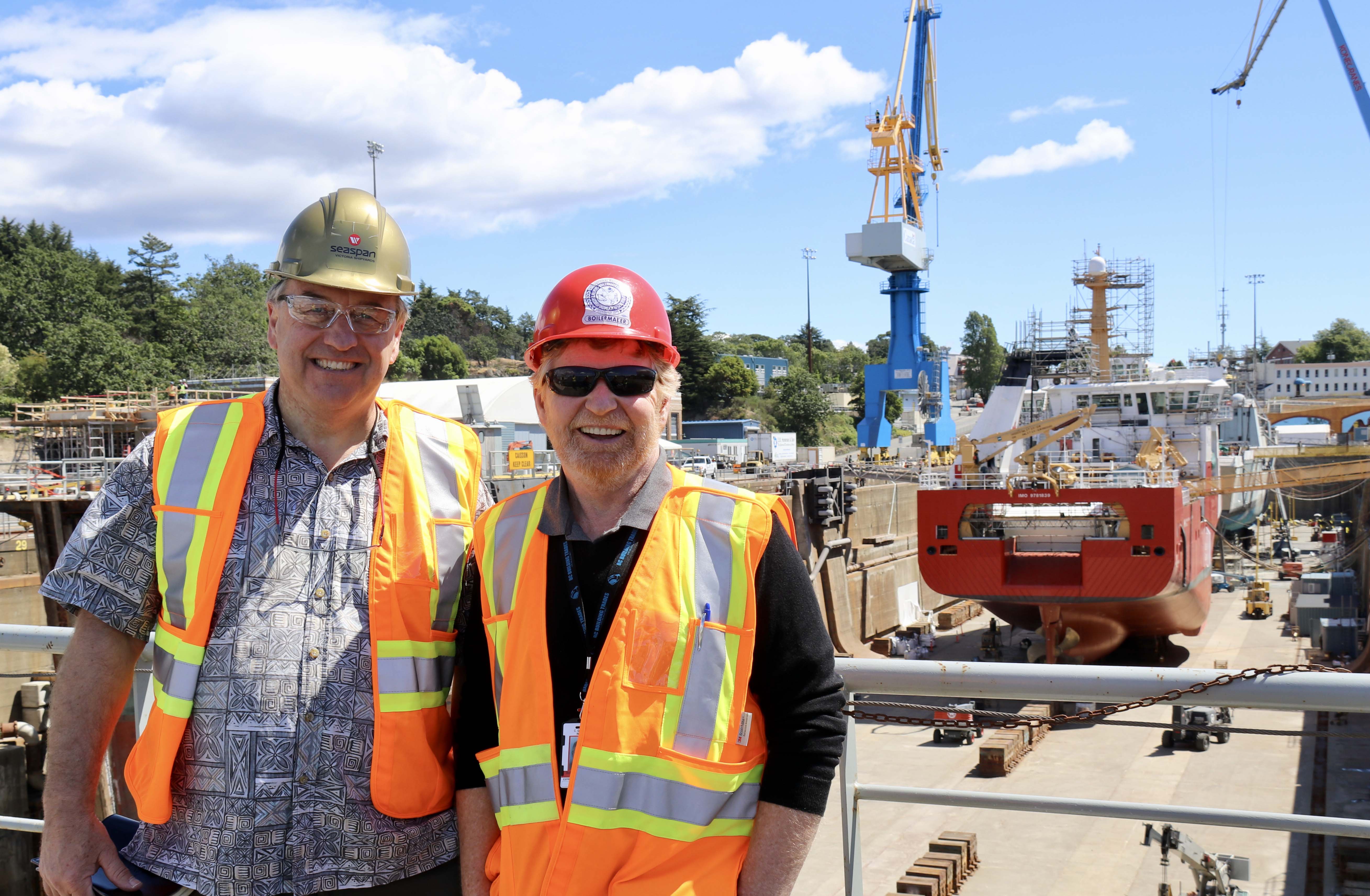Jobs
Statement on LNG Canada Final Investment Decision
Today a positive final investment decision was reached on phase one of LNG Canada’s proposed LNG export facility in Kitimat. My office released the statement below in response to this announcement.
Media Release
Weaver statement on LNG Canada FID
For immediate release
October 1, 2018
VICTORIA, B.C. – Andrew Weaver, leader of the B.C. Green Party, responded to the news that the LNG Canada project has received a positive final investment decision (FID).
“I am deeply disappointed that the NDP minority government’s tax giveaway has resulted in the country’s single biggest source of emissions receiving an FID,” said Weaver.
“Adding such a massive new source of GhGs means that the rest of our economy will have to make even more sacrifices to meet our climate targets. A significant portion of the LNG Canada investment will be spent on a plant manufactured overseas, with steel sourced from other countries. B.C. taxpayers will subsidize its power by paying rates twice as high and taking on the enormous public debt required to build Site C. There may be as little as 100 permanent jobs at LNG Canada. I believe we can create far more jobs in other industries that won’t drastically increase our emissions.
“In opposition, the NDP were outspoken critics of the Liberal’s LNG regime, then rightly noting that it did not amount to a fair value for our resource and that the emissions were too high. Our Caucus was shocked when they turned around and delivered an even larger giveaway once in power. We did everything we could to deter them from making this decision, but we are only three MLAs up against the 84 whose parties support the heavy subsidization of this industry.
“It breaks my heart that the young people of today must watch as politicians who once professed to champion climate action and a hopeful vision for the future instead succumb to the temptation of short-sighted political wins. Young people deserve better and our Party will keep fighting for them.
“Our Caucus has been clear that we do not support the government’s LNG regime. The government does not have our votes to implement this regime and will have to work with the B.C. Liberal MLAs if they want this project to go forward.
“Despite our profound disappointment on this issue, we have been working closely in good faith with the government to develop a Clean Growth Strategy to aggressively reduce emissions and electrify our economy. The B.C. NDP campaigned to implement a plan to meet our targets and reaffirmed that promise in our Confidence and Supply Agreement. We will hold them to account on this. We will have more to say once that plan becomes public later this year.”
-30-
Media contact
Jillian Oliver, Press Secretary
+1 778-650-0597 | jillian.oliver@leg.bc.ca<mailto:jillian.oliver@leg.bc.ca>
Results of first quarterly report: Focus on innovation paying off
The BC Government today released it’s first quarterly report. The report outlines a fiscally healthy economy that is becoming more diversified. Key aspects of the BC Green Party economic vision for the province were embedded in the Confidence and Supply Agreement we signed with the BC NDP. We are very pleased to see the focus on innovation in creating a diversified 21st century economy is beginning to pay off.
Going forward, government needs to continue to nurture the diversification of our economy, in order to create prosperity for British Columbians as the climate changes and the global economy shifts.
Below is the press release that we issued in response to the first quarterly report.
Media Release
Weaver welcomes results of first quarterly report
For Immediate Release
September 7, 2018
VICTORIA, B.C. – Andrew Weaver welcomed the results of the first quarterly report, released today.
“The first quarterly report shows that B.C. continues to be on strong economic footing”, said Andrew Weaver, leader of the B.C. Green Party.
“So far in its term, this government has shown a willingness to tackle the financial problems it inherited, such as at ICBC and BC Hydro, while beginning to act on joint commitments outlined in our Confidence and Supply Agreement (CASA).
“Key parts of this government’s economic agenda came from CASA, including the focus on innovation in creating a diversified 21st century economy. Key B.C. Green initiatives embedded in CASA included establishing the Emerging Economy Task Force, which will advise government on how to respond to the changing nature of business over the next 10-25 years, and the Innovation Commissioner, who is advocating for our emerging tech sector.
“Going forward, government needs to continue to nurture the diversification of our economy, in order to create prosperity for British Columbians as the climate changes and the global economy shifts. The forthcoming clean growth strategy is a key means to accomplish this outcome.”
-30-
Media contact
Sarah Miller, Acting Press Secretary
+1 250-858-9891 | sarah.miller@leg.bc.ca
Statement on Labour Day
Monday September 3 is Labour Day, a day where we collectively recognize the achievements of Canadian workers and the right of all British Columbians to safe and equitable employment. Below is the media statement I released in celebration of Labour Day.
Media Statement
Andrew Weaver statement on Labour Day
For immediate release
August 31, 2018
VICTORIA, B.C. – Andrew Weaver, leader of the B.C. Greens, issued the following statement today in recognition of Labour Day:
“On Labour Day we recognize the achievements of Canadian workers and the right of all British Columbians to safe and equitable employment.
“Our job landscape is changing. Amidst trends like the rise of the gig economy, the ever-changing nature of technology and the implications of climate change, it is vital that governments actively modernize our policies in order to support workers.
“We are excited about the successes of the past year. The Emerging Economy Task Force, for example, is analysing changing trends in the economy to propose policy options for government to ensure our continued success. The Basic Income Expert Committee is exploring how to best support low-income British Columbians so that we are all better prepared for the changing horizons of the workforce. Increased investments in advanced education, skills, and training are helping our workforce grow and diversify.
“As we head into the fall we continue to focus on the changing nature of work and strive to bring British Columbians the investments and services they need to succeed.
“On behalf of my colleagues, I’d like to wish all British Columbians a safe and happy Labour Day weekend.”
-30-
Media contact
Jillian Oliver, Press Secretary
+1 778-650-0597 | jillian.oliver@leg.bc.ca
On Ontario’s cancellation of its basic income pilot
Over the last week, I have been following the news that Ontario has decided to cancel its basic income pilot, only one year into what was supposed to be a 3-year project.
I am saddened by the decision made by the government of Ontario, for a number of reasons.
I was, of course, looking forward to learning from Ontario’s pilot project, which would have provided a wealth of evidence about the effects of basic income. Ontario was leading the country in assessing the impacts of this policy, and their project was being watched around the world. They were tracking changes in employment, health, education, food security and housing, as well as community-level effects in Lindsay, with independent assessment by university researchers.
Before Ontario, the last pilot in Canada took place in Dauphin, Manitoba, over 40 years ago. This pilot illustrated some very promising results: in just 3 years, hospital visits were reduced by 8.5%.
Researchers attributed this marked decrease to lower levels of stress in low income families, which resulted in lower rates of alcohol and drug use, lower levels of domestic abuse, fewer car accidents, and lower levels of hospitalization for mental health issues.
In deciding to cancel the pilot, Ontario, and our whole country, has lost a significant opportunity to learn about the effects of basic income and to be on the leading edge of exploring this policy.
But what has struck me the most in the last week since the news of cancellation are the individual stories coming out of Ontario, from those enrolled in the pilot, whose lives are deeply affected by this decision.
So many stories have highlighted how people’s lives changed once they began receiving basic income. These stories have highlighted, too, the substantial human cost to cancelling this pilot part way through, when thousands of people had made plans and decisions on what they thought was stable ground.
Some participants in the pilot decided to attend college for the first time, or returned to school, to pick up the skills needed for meaningful employment or to start a new career. Others began living independently, or found secure accommodation for the first time. For some, it was the newfound ability to afford healthy food and other small things to improve the quality of their lives, and the lives of their children. Others used the income to pay down long-standing debts.
Many spoke about the reduced stress they felt, the ability to plan into the future instead of worrying only about the day-to-day, and a feeling of greater independence and dignity.
Many participants in the program were working, but still couldn’t afford the necessities of life and make ends meet.
One individual who was part of the pilot wrote to me highlighting the impact that basic income had on him and his family. Despite both working, he and his wife had amassed a significant amount of debt, which they struggled to pay off as they tried to provide for their children. The program, he said, was allowing them to pay down their debt and do more with their children. Most importantly, he said, he could finally see the light at the end of the tunnel to better days, for him and his children.
In his words, “this program … gave people that really needed hope a lot of hope for a brighter future.”
These individual stories speak to the promise I believe basic income holds – as a better way to support people as they navigate the economic challenges of the 21st century. Recent years have seen disproportionate increases in part-time and contract work. Wages have stagnated while the cost of living in our cities has spiralled out of control. Meanwhile, studies estimate that half of Canadian jobs could be impacted by automation in the next decade alone. We proposed exploring basic income in B.C. because we believe that government needs to have a plan for the changes on the horizon.
The experiences of people in Ontario has made me see even more strongly the need to do serious work exploring this policy. I have previously written a four part series (Part I, Part II, Part III, and Part IV) outlining why I think basic income is an idea that we need to explore in BC. Establishing a pilot project formed a key aspect of the Income Security component of our BC Green 2017 election platform.
We’re forging ahead in BC with our expert committee, an expert panel comprising three distinguished researcher that launched last month and is studying how basic income could work in BC. This committee is the first step towards fulfilling a government commitment under CASA to pilot basic income in BC. I am hopeful that the committee’s work will provide the evidence that governments need to decide how to proceed – not only here in BC, but across Canada.
In this time of change, as we grapple with the challenges we face today and on the horizon, policymakers have a responsibility to plan for the future, and to make decisions that will give their citizens the best possible chance to pursue their dreams and to achieve success. In a country as wealthy and as compassionate as ours, that’s the goal our leaders should be working towards.
Community benefits agreements & the proposed BC Infrastructure Benefits Inc.
Earlier this week the BC government announced 2 public infrastructure projects that will be delivered under “Community Benefit Agreements” (CBAs), and the creation of a new Crown corporation, BC Infrastructure Benefits Inc., (BCIB) that will oversee the implementation of these agreements.
In response to media requests on this announcement we issued the following statement :
“Community benefit agreements are a great way to invest in our province’s future and a key tool that government can use to advance social and environmental goals. In particular, investing in training and apprenticeships for young people, First Nations and women will help set those British Columbians up for long-term success, which will have significant knock-on benefits for our province and its communities.
I look forward to seeing the details of the government’s overall framework. I will be looking to ensure that it is fair and effective from a policy perspective, rather than a political or ideological one. While our caucus’ approach to labour policy differs in some respects from the BC NDP’s, I believe there are significant opportunities for us to collaborate to modernize BC’s laws so that we can best set British Columbians up for success amidst major global economic shifts.
I look forward to seeing the details of this agreement and working with Minister Bains to meet our CASA commitment to find innovative ways to improve fairness for workers.“
In response to a number of questions, I wanted to expand on this statement.
Without a doubt, CBAs can be a good policy tool to accomplish important objectives for public construction projects, such as increased apprenticeships, increased participation for indigenous trades workers, women and other underrepresented groups, commitment to local hiring, and more certainty on wages on project timelines.
A strong building trades labour force is critical for our province’s future. To meet our climate targets and build a stronger, sustainable economy, we are going to need to make significant investments into our existing building stock, as well as building new infrastructure including public transportation. We also need to ensure our workforce develops, in particular by ensuring that there are enough apprenticeship opportunities to train new workers.
However, CBAs must be advanced as a policy tool to address the values I outlined above – not as a tool to pay back political favours or to advance ideology at the expense of good policy. We have made this perspective clear to the government, and will be applying this approach to reviewing how the government awards Community Benefit Agreements in the future.
We have also asked government to provide reasoning for why the two projects announced earlier this week had a unionization requirement for workers on these two sites.
It is our view that CBA should be applicable for both union and non-union trade shops and that we are focused on ensuring that whoever is competing for a contract is meeting the requirements laid out in the CBA. To be clear – CBAs can be good policy, providing a good tool for government to help drive the development of a strong building trades labour force, as long as we use them for policy not partisan reasons.







